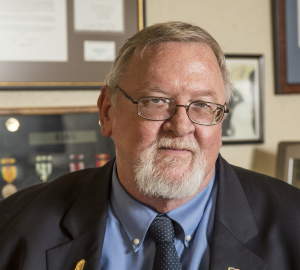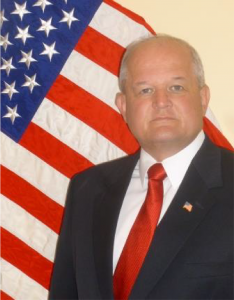Honoring the Legacy of Veteran Entrepreneurship: NVBDC and the Data That Proves It Works
According to Babson College’s Global Entrepreneurship Monitor (GEM) report, veteran entrepreneurs are making a profound impact on our communities, our economy, and the nation as a whole.
Speaking at the National Veteran Business Matchmaking Event in Columbus OH, hosted by the National Veteran Business Development Council (NVBDC), Elmore—widely regarded as the architect of federal legislation establishing Veteran-Owned Businesses (VOBs)—delivered a compelling keynote address. As the SBA’s first-ever Associate Administrator for Veterans Business Development, Elmore was instrumental in opening doors for veteran entrepreneurs, leading to a more than 400% increase in veteran participation in SBA programs over a 12-year span.
His groundbreaking contributions include the creation of the SDVOSB and VOSB government contracting programs, the launch of initiatives like V-WISE and TAP–Boots to Business, and the expansion of the Veterans Business Outreach Center (VBOC) program. These efforts laid the groundwork for organizations like NVBDC to thrive and to play a pivotal role in private-sector supplier diversity.
“Veteran business recognition is not a ‘benefit’ or something that was ‘granted’ because you’re a veteran,” Elmore reminded the audience. “It was a hard-fought legislative effort that needs to be protected and honored by today’s veteran business owners. Remember, anything created in legislation can be eliminated.” His message is a powerful reminder of the responsibility veteran entrepreneurs have in preserving and strengthening this legacy.
That legacy is evident today in the Billion Dollar Roundtable’s (BDR) inclusion of NVBDC-certified Service-Disabled and Veteran-Owned Businesses (SD/VOBs) in its diversity spend metrics. The BDR—an elite group of corporations each spending over $1 billion annually with diverse suppliers—reported a $122.7 billion economic impact on diverse suppliers in 2023. Notably, $4.3 billion of that spend was directed specifically to NVBDC-certified SD/VOBs.
This milestone demonstrates the increasing visibility and influence of veteran-owned businesses in corporate supply chains and the critical role NVBDC plays in that transformation. As NVBDC Founder and CEO Keith King stated, “This incredible next step in recognizing and accepting our certified SD/VOBs changes the entire market.”
Our mission to expand private-sector opportunities for veteran-owned businesses is a continuation of Elmore’s enduring legacy of public-sector advocacy. As veteran business ownership continues to grow, our focus remains clear: build more pathways, ensure equitable access, and protect the recognition that our community has rightfully earned.
“I continue to call on Congress to reverse its December 1974 decision to eliminate small business lending from today’s GI Bill and to finally, fully include all veteran-owned small businesses in the Department of Defense’s supplier base,” said Elmore. “Keith, thank you—and thank your team—for building a gateway to private contracting opportunities for veteran-owned businesses in America. We both understand that when Congress defunded veteran entrepreneurship in 1974, it left our future to chance. It took 25 years to create the tools to rebuild public opportunity. Growing private-sector opportunities is just as complex, just as massive, and just as vital. So, a special salute to you, your team, and your private partners.”
To Bill Elmore—thank you for being the architect of opportunity. To our certified veteran businesses and corporate partners—thank you for building what comes next.
About the National Veteran Business Development Council (NVBDC)
NVBDC is the leading veteran-owned business certification organization developed by veterans for veterans. It was formed to provide a credible and reliable certifying authority for veteran-owned businesses of all sizes and in all industries. NVBDC ensures the existence of valid documentation for veterans’ status, ownership, and operational control, giving customers and clients peace of mind that they are working with a valid veteran-owned business.
Additional information can be found at www.nvbdc.org.
https://nvbdc.org/certification-issues/honoring-the-legacy-of-veteran-entrepreneurship-nvbdc-and-the-data-that-proves-it-works/
Keith King, Founder & CEO
National Veteran Business Development Council
+1 313-446-6885
email us here
Visit us on social media:
Facebook
X
LinkedIn
Legal Disclaimer:
EIN Presswire provides this news content "as is" without warranty of any kind. We do not accept any responsibility or liability for the accuracy, content, images, videos, licenses, completeness, legality, or reliability of the information contained in this article. If you have any complaints or copyright issues related to this article, kindly contact the author above.
Loading Spout Market is Expected to Progress at a CAGR of 5.4% to Reach US$ 6,491 Million by 2035
Structural Foam Market to Reach USD 152.9 Billion by 2035, Driven by Construction and Automotive Industry Demand
Probiotic Serum Market to Reach USD 2.841 Billion by 2035, Driven by Anti-Aging and Tech Innovations
Więcej ważnych informacji
 Jedynka Newserii
Jedynka Newserii

 Jedynka Newserii
Jedynka Newserii

Polityka

UE przyspiesza inwestycje w obronność i bezpieczeństwo. Pomagają w tym nowe narzędzia finansowe i uproszczenia dla przemysłu obronnego
Unijne inwestycje w bezpieczeństwo i przemysł obronny nabierają tempa. Strategia Gotowość 2030 zakłada integrację krajowych przemysłów obronnych państw członkowskich oraz rozwój nowych technologii w armiach. Komisja Europejska proponuje też różne możliwości zwiększenia finansowania wydatków obronnych. – Unia Europejska postawiła na bezpieczeństwo nie tylko w wymiarze deklaracji, ale też konkretnych programów – podkreśla Michał Szczerba, europoseł z Platformy Obywatelskiej.
Handel
Inflacja w nadchodzących miesiącach będzie pozostawała w celu inflacyjnym. Pojawia się duża przestrzeń do obniżek stóp procentowych

Inflacja już znajduje się w paśmie dopuszczalnych odchyleń od celu inflacyjnego i wszystko wskazuje na to, że pozostanie w nim przez dłuższy czas. Rada Polityki Pieniężnej również ma tego świadomość. Dlatego w czasie najbliższych posiedzeń powinny się pojawić obniżki stóp procentowych. Zdaniem ekonomisty dr. Jarosława Janeckiego rozsądnym poziomem głównej stopy procentowej byłby poziom 3,5–4 proc., czyli można się spodziewać obniżek o 100–150 punktów bazowych.
Nauka
Pomiar dokładnej liczby ludności pozostaje dużym wyzwaniem. W erze migracji wymaga to nowych narzędzi i definicji

Dokładne i porównywalne dane na temat ludności są niezbędne m.in. do celów statystycznych i administracyjnych. Dlatego rośnie zapotrzebowanie na statystyki z zakresu demografii, migracji, starzenia się społeczeństwa oraz dane regionalne i lokalne. Państwa Unii Europejskiej odchodzą od „tradycyjnego” spisu przeprowadzanego co 10 lat w kierunku wykorzystania danych ze źródeł administracyjnych. Przyszłością jest wykorzystanie w pomiarze danych z mediów społecznościowych czy sieci komórkowych.
Partner serwisu
Szkolenia

Akademia Newserii
Akademia Newserii to projekt, w ramach którego najlepsi polscy dziennikarze biznesowi, giełdowi oraz lifestylowi, a także szkoleniowcy z wieloletnim doświadczeniem dzielą się swoją wiedzą nt. pracy z mediami.












.gif)

 |
| |
| |
|